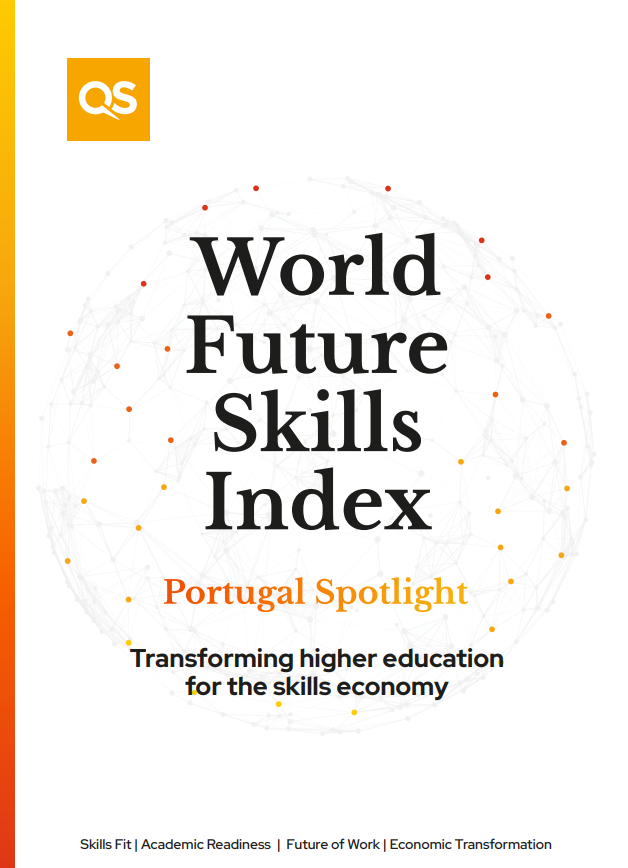Portugal demonstrates strong Academic Readiness, scoring highly in AI, Digital, and Green skills. However, weaker performance in Future of Work and Economic Transformation highlights a disconnect between academic excellence and workforce adoption, with limited progress in digital integration and high-value job creation.
Welcome to the Portugal Spotlight on the QS World Future Skills Index, where we explore higher education’s critical role in shaping the workforce of tomorrow. This tailored resource empowers you to analyse Portugal’s future skills supply and demand, benchmark key industry jobs and skills gaps against over 80 countries, and align your higher education system with the skills training required for economic transformation.
Portugal performance overview
Portugal’s higher education system is academically strong, reflected in Academic Readiness (92.1) and high AI (88.8), Digital (91.0), and Green (92.8) sub-indicator scores. However, its Future of Work score (66.9) reveals a major disconnect between digital academic excellence and digital workforce adoption. With Digital Future of Work at just 59.3 and Economic Capacity at 36.0, Portugal faces a challenge: it produces highly skilled graduates and strong research outputs, but its economy struggles to translate these into job creation and industry-wide digital adoption. Without a robust digital transformation strategy, Portugal risks under-utilising its talent, slowing innovation, and losing competitiveness in emerging industries.
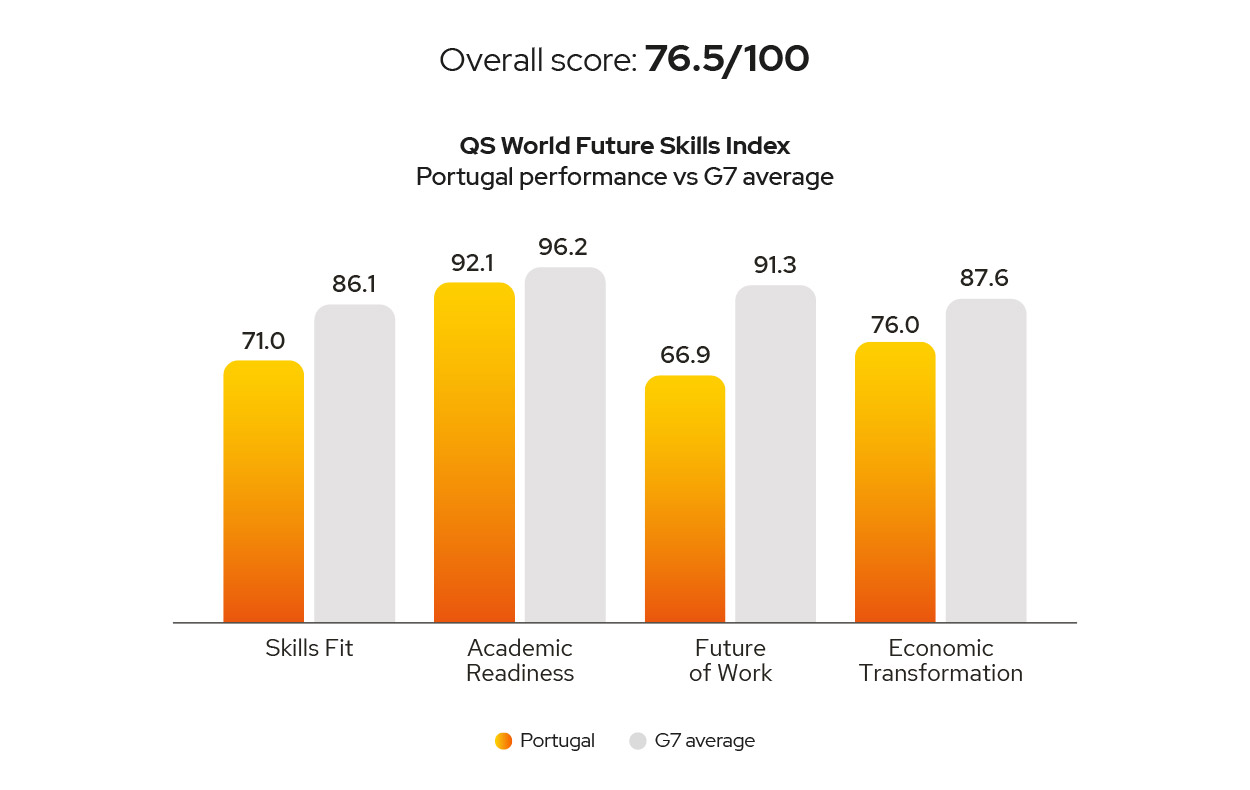
About the indicators
Skills Fit
The Skills Fit indicator measures how well countries are equipping graduates with the skills that employers desire. This is assessed by determining the gap between what employers find important and their level of satisfaction with the skills provided by graduates. This is done using data from the QS Global Employer Survey, the largest of its kind, and data from the World Bank Group. Since 2021, over 100,000 employers have rated the importance of certain skills and their satisfaction in their graduate hires.
Future of Work
The Future of Work indicator evaluates a country’s readiness to recruit for the skills needed in the jobs of tomorrow. Specifically, it measures how well the job market is prepared to meet the growing demand for digital, AI, and green skills, all of which are becoming critical as economies transition towards technology-driven and sustainable industries.
Academic Readiness
This dimension measures how well a country is prepared for the future of work. We look at the number of universities assessed for the QS World University Rankings by Subject, and how they perform. We then measure this in tandem with population size – if a country has a large population but few well-ranked institutions, for example, the country will be penalised.
Economic Transformation
Economic Transformation uses a weighted formula to assess a country’s readiness to support the growth and future of work and skills by examining various key indicators. The Index highlights whether a country has the infrastructure, investment power, and talent available to transition to industries driven by AI, digital transformation, green technologies, and high-skilled work, using data from the World Bank Group, UNESCO Institute for Statistics and the Education Policy Institute
Portugal performance in detail
Skills Fit
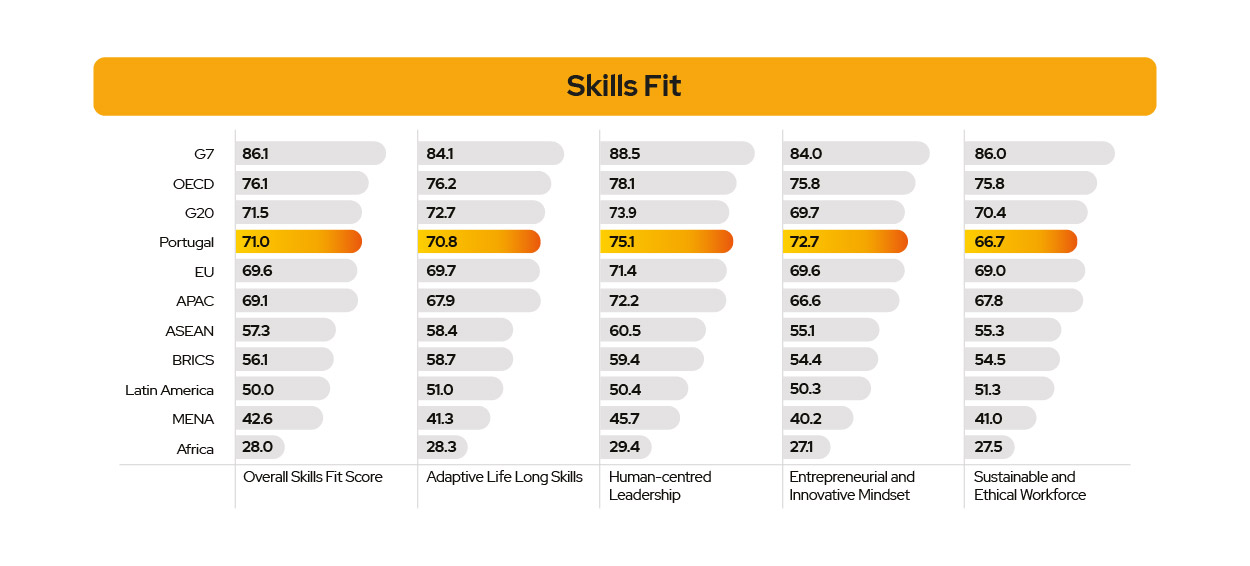
Portugal’s graduate workforce is relatively well-prepared, with strong Human-Centred Leadership (75.1) and Entrepreneurial & Innovative Mindset (72.7). However, Adaptive Lifelong Skills (70.8) is the lowest among its Skills Fit indicators, highlighting a need to further develop continuous learning and reskilling pathways. As automation and digital transformation accelerate, universities must strengthen flexible learning programmes, micro-credentials, and industry-integrated reskilling initiatives to ensure that professionals can navigate an evolving job market. Expanding workforce adaptability will be crucial in maximising the potential of Portugal’s labour force.
Future of Work
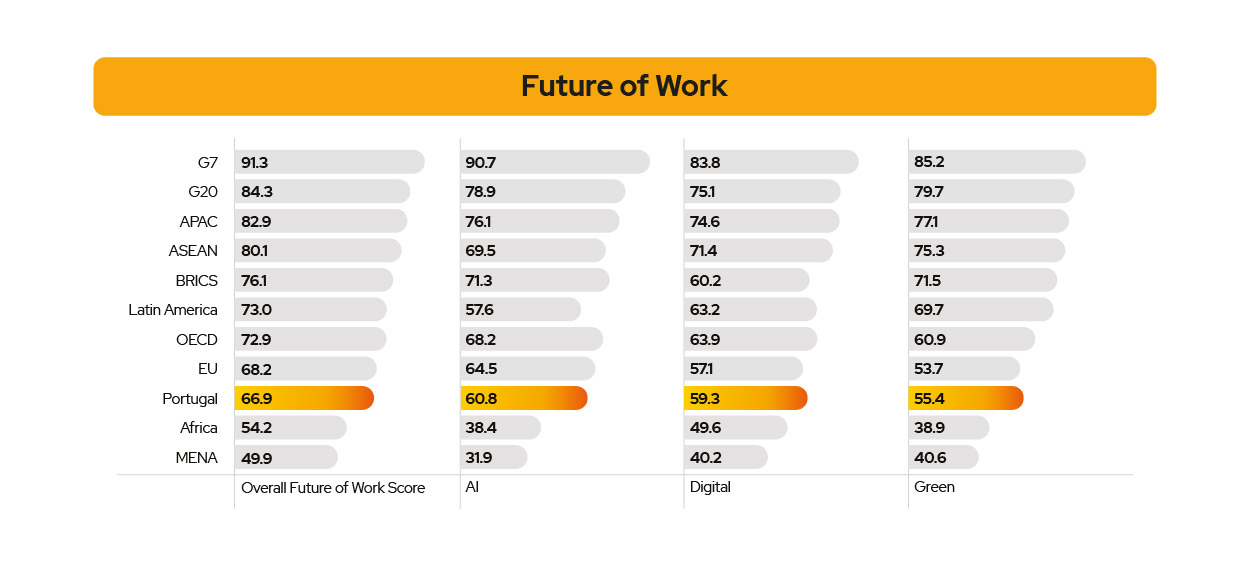
The Future of Work score (66.9) reflects a labour market in transition, with slow AI, Digital, and Green skills adoption despite strong academic readiness in these areas. While employer demand for future-oriented skills is growing, the country faces a bottleneck in digital workforce integration, limiting its ability to fully leverage AI and automation. Universities must embed industry-focused digital education, expand employer-led upskilling initiatives, and foster AI literacy across disciplines to ensure graduates possess practical, job-ready digital expertise to strengthen workforce resilience and drive long-term economic competitiveness.
Academic Readiness
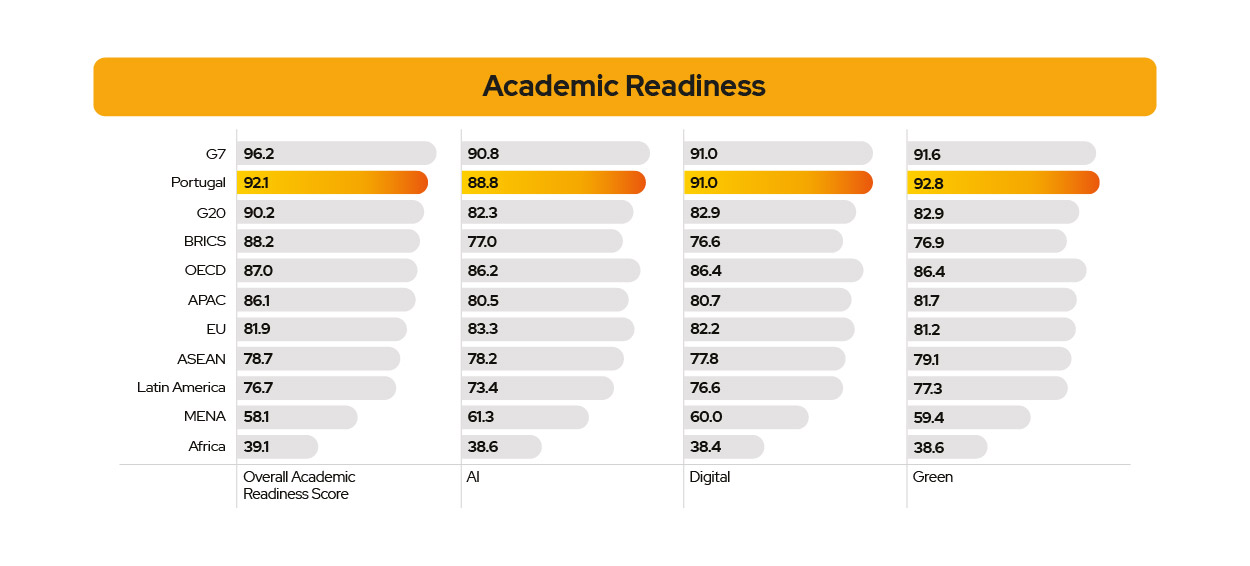
Portugal’s strong performance reflects a well-established academic ecosystem producing highly skilled graduates. However, the disconnect between digital academic strength (91.0) and digital workforce adoption (59.3) suggests a gap in practical application. To translate excellence into economic growth, universities must expand industry partnerships in applied AI, sustainability, and digitalisation. Strengthening work-based learning, co-designing curricula with employers, and integrating interdisciplinary AI-Green skills will be critical in turning Portugal’s knowledge capital into a competitive advantage for its industries.
Economic Transformation
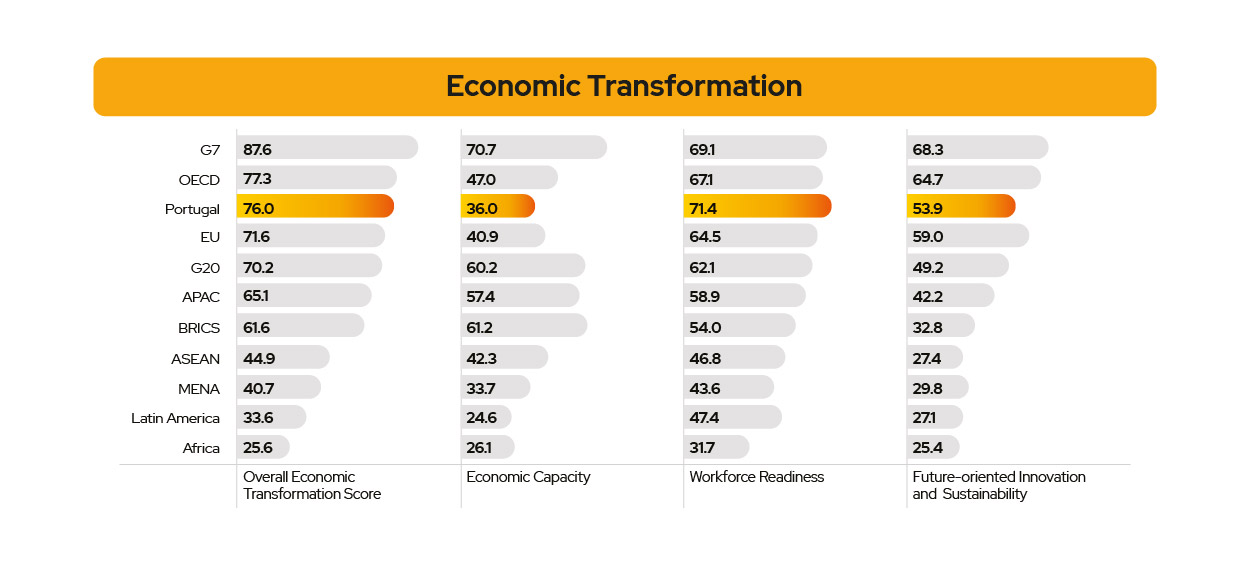
Portugal’s Economic Transformation score (76.0) highlights progress in transitioning towards a higher-value economy. Workforce Readiness (71.4) indicates that Portugal has a solid labour market foundation, yet Economic Capacity (36.0) suggests that further efforts are needed to stimulate industry growth and job creation. Investment in R&D remains moderate (1.72% of GDP), and enhancing research commercialisation can help drive Portugal’s innovation ecosystem. Expanding university-led entrepreneurship, reinforcing sustainability-focused education, and strengthening collaboration between academia and industry will be key to sustaining Portugal’s long-term economic momentum.
Conclusion and analysis
Portugal’s higher education system is well-positioned for innovation and talent development, with strong Academic Readiness (92.1) and a solid foundation in AI, Digital, and Green skills. However, Future of Work (66.9) highlights a misalignment between academic excellence and workforce application, particularly in digital transformation and industry readiness. While Economic Transformation (76.0) suggests ongoing progress, Economic Capacity (36.0) signals the need for greater investment in high-value industries to fully leverage Portugal’s talent pipeline. Strengthening university-business collaboration, expanding digital workforce integration, and reinforcing AI-driven upskilling initiatives will be essential to closing the gap between academic success and long-term economic impact.
Our analysis and recommendations:
- Portugal’s strong academic foundation in Digital skills (91.0) is not translating into workforce adoption (59.3), highlighting a disconnect between higher education and industry needs. Without a structured approach to digital acceleration, Portugal risks failing to capitalise on its research strength, leading to a shortfall in job creation and talent retention. Universities must embed digital skills into interdisciplinary programmes, enhance work-integrated learning, and expand microcredentialing and reskilling initiatives to ensure that graduates are job-ready in high-growth sectors.
- Portugal’s Academic Readiness (92.1) and Digital research leadership have yet to translate into sustained economic momentum. A lack of industry-led digital integration means that graduates are well-trained but struggle to enter high-value digital jobs. To reverse this trend, universities must focus on applied AI, data analytics, and sustainability-oriented technology adoption, while policymakers should drive investment into commercialising research and expanding the start-up ecosystem. Without a targeted digital strategy, Portugal risks stagnation and an outflow of skilled talent, instead of leveraging its higher education strength for long-term economic resilience.
- Despite the country’s highly skilled graduate workforce, Economic Capacity (36.0) remains an area for growth. Expanding R&D commercialisation, supporting university-led innovation, and strengthening start-up ecosystems will ensure that Portugal’s research excellence translates into economic impact.









.jpg)





